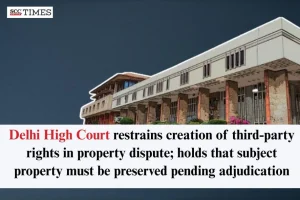Delhi High Court: In an appeal challenging dismissal of application under Order XXXIX Rule 1 & 2 CPC in a suit for specific performance of an unregistered agreement to sell in which one of the clauses stipulated a refund of double the earnest money, Girish Kathpalia, J., directed the respondents to not create third party interest in the subject property as till decision of the appeal, the subject property needs to be preserved.
The present appeal arose out of a property dispute concerning the basement portion of property in Greater Kailash-I, New Delhi. The property was originally purchased by Dr. Nagrath and his wife, late Ms. Nagrath in 1968 and later redeveloped under a 2010 collaboration agreement, by which the owners were allotted the basement, ground floor, first floor, third floor with terrace, and part of the stilt area.
After Ms. Nagrath’s death in 2012, her interest devolved upon Dr. Nagrath by virtue of a will. On 09-05-2023, Dr. Nagrath entered into an Agreement to Sell with the appellant for the sale of the entire basement (“suit property”) for a total consideration of ₹57,10,00-. An amount of ₹5,00,000 was paid as earnest money, and the sale deed was to be executed on or before 30-11-2023.
The agreement contained two critical clauses: Clause 8, which permitted the buyer to either seek refund of double earnest money or to “get the sale affected in his/her name through court of law” in case of seller’s default; and Clause 11, which bound the “legal heirs of both parties” to the terms of the contract.
Before the sale could be executed, Dr. Nagrath passed away on 20-12-2023. His family advocate was informed on 23-12-2023 by a relative that an agreement to sell had been entered into between the deceased and a Chandigarh-based purchaser. Thereafter, the appellant remained in contact with the legal heirs, and at the request of respondent no. 1 (one of the heirs), his company prepared a valuation report dated 18-06-2024 for the property.
However, without the appellant’s knowledge, respondent 1 alone executed another Agreement to Sell on 24-06-2024 in favour of respondent 4, covering both the basement and ground floor. Notably, that later agreement itself referred to the earlier 09-05-2023 agreement with Dr. Nagrath and shifted the risk of litigation and previous payments onto the new vendee.
When the appellant discovered this, he issued a legal notice on 18-06-2025 to the legal heirs, calling upon them to honour the earlier agreement. Respondent 1 replied through counsel on 11-07-2025 denying the claim, while respondents 2 and 3, in their reply dated 05-07-2025, disclosed that they had not consented to the 24-06-2024 transaction and that disputes existed between the heirs.
On 04-09-2025, the appellant filed a civil suit before the District Judge (South), Saket, seeking specific and mandatory injunctions to enforce the 09-05-2023 agreement, to restrain alienation, and to declare the 24-06-2024 agreement void.
An application under Order XXXIX Rules 1 and 2 CPC was filed for an ex parte ad-interim injunction to prevent third-party transfers. However, by order dated 06-09-2025, the trial court dismissed the injunction application, holding that an agreement to sell does not create any title or interest in the property and that since Clause 8 provided for refund of double earnest money, there was no irreparable loss. The Trial Court held that legal heirs of the deceased vendor were “third parties” vis-à-vis the agreement.
Aggrieved, the appellant preferred first appeal before the Delhi High Court on grounds that Clause 11 expressly bound the heirs; that they had actual notice of the agreement; and that respondent 1’s conduct of obtaining a valuation and executing a subsequent sale acknowledging the earlier one was evidence of collusion. The appellant further submitted that the Trial Court failed to apply for the settled “triple test” for injunction as laid down in Dalpat Kumar v. Prahlad Singh, (1992) 1 SCC 719.
It was argued that the Trial Court erred in treating monetary compensation as adequate relief because the property’s alienation would irreversibly frustrate the appellant’s right to specific performance. The appeal also highlighted that respondent 1 had not obtained probate of Dr. Nagrath’s will and, hence, had no authority to unilaterally sell the property.
On the other hand, counsel for respondents 2 and 3 supported the appeal to the extent that respondent 1 had indeed acted unilaterally, entering multiple agreements without probate, and agreed that the subject property required protection.
The Court held that by order dated 15-10-2025, issued notice in the appeal and granted interim protection to preserve the property.
Taking note of the submissions that respondent no.1 was executing multiple sale agreements without probate, and that the 24-06-2024 agreement itself acknowledged the earlier contract with the appellant, the Court found a prima facie case for protection of the subject matter.
The Court directed that:
“Till the next date of hearing, the respondents shall not create any third-party interest in the subject property.”
[Rajnish Bhardwaj v Renu Woodbridge, 2025 SCC OnLine Del 6546, decided on 15-10-2025]
Advocates who appeared in this case :
Ms. Amrita Sarkar, Advocate for appellant
Mr. Swarnendu Chatterjee, Advocate for R2&3

